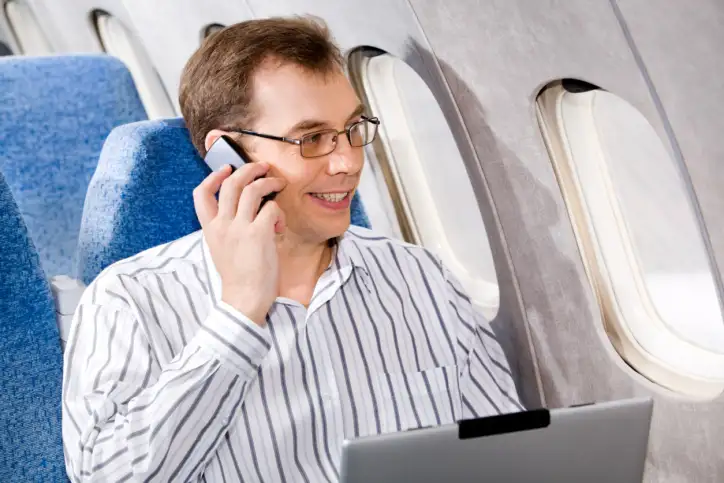
The Airline Passenger Experience Association (APEX), “a network of leading airlines, suppliers, and related companies committed to elevating the level of the airline passenger experience,” released its latest “global survey of passengers,” and the primary conclusion is that passengers want to be thoroughly connected and wired. That theme also pervades the association’s 10-year travel forecast: No matter how bad the rest of your travel experience may be, you’ll be connected.
Connected or no, the central conclusion about the future of air travel is contained in this excerpt from the current issue of Airline Passenger Experience, APEX’s publication: “Seat manufacturers are now under constant pressure from their airline customers to focus on three design parameters: lighter seats, increased number of seats abreast with varying widths, and reduced seat pitch.” In short, expect economy class to get worse, not better. “Lighter, tighter, and narrower” is the guiding principle.
Beyond that overview, much of the detailed APEX forecast focuses on more and better electronic connectivity:
- By the end of next year, most airlines will offer mobile check-in, most will sell tickets through mobile apps, almost all airports will provide kiosks for automated check-in, and most will also provide automated self-service baggage tag printing. The takeaway here: We’ll make sure that you do more of the work we used to do.
- In five years, you’ll have an automated individual “e-agent” that goes everywhere with you, inside a watch or piece of small jewelry, and a few years later, biometric data cards will replace passports. The latter would be a great idea—provided the data card can actually help you get through customs and immigration procedures more quickly, not just provide security information. I’m not holding my breath until that happens.
- The 10-year forecast sticks with its connected theme, suggesting that travelers will be able to walk straight through a hotel lobby to an elevator and a room without having to go through any check-in process. Beyond that, however, the forecast goes a bit off track. The writer predicts airline seats that remember you from previous trips, mold to your body, and have individual climate control. Oh? And how, exactly, does that square with the “tighter, lighter, narrower” mantra?
Another questionable prediction is that planes will cruise at speeds “just short of supersonic levels,” reducing what was once a 13-hour trip to seven hours. This one really doesn’t compute: Today’s planes cruise at about Mach 0.8 and “just under supersonic” would be about Mach 9.5, so it’s hard to see how a 19 percent increase in cruise speed will cut travel times by 54 percent, especially given that faster cruise speed wouldn’t change taxi, takeoff, climb, descent, and landing times.
Overall, it’s pretty clear that APEX is zeroed in on connectivity at all levels. There’s nothing wrong with that focus; it’s equally clear that airlines will keep piling on the connectivity hoping it will take your mind off the increasingly crowded and uncomfortable seating—especially if they can charge a big fat fee for the connectivity. In 10 years, you will undoubtedly find that onboard Wi-Fi will be essentially ubiquitous and that almost all of the current paperwork and person-to-person interaction associated with the travel process will be automated.
But it’s hard to escape the conclusion that despite all the high-tech, the next 10 years of air travel—at least in the rear cabin—will keep getting worse. As people get bigger—APEX actually shows some data about that—seats keep getting smaller. As to the APEX membership’s commitment to “providing a world-class airline experience for passengers around the globe,” that world-class experience will be confined to the front cabin of the plane.
APEX also released the results of its latest survey, which are about what you’d expect. Some 36 percent of those sampled want connectivity improvements and 28 percent want expanded in-flight entertainment options. Beyond the wired features, however, a surprisingly low 38 percent cited “comfortable seating” as the top priority. All in all, no surprises; you can check survey details in the survey press release.
Ed Perkins on Travel is copyright (c) 2014 Tribune Media Services, Inc.
You Might Also Like:
We hand-pick everything we recommend and select items through testing and reviews. Some products are sent to us free of charge with no incentive to offer a favorable review. We offer our unbiased opinions and do not accept compensation to review products. All items are in stock and prices are accurate at the time of publication. If you buy something through our links, we may earn a commission.
Related
Top Fares From
Today's Top Travel Deals
Brought to you by ShermansTravel
France: 8-Night Paris, Avignon & Nice...
Infinity Worldwide Vacations
 vacation
$2880+
vacation
$2880+
Poconos: 3 Nts in Garden of...
ResortsAndLodges.com
 hotel
$305+
hotel
$305+
7-Nt Canada & New England Cruise,...
Princess Cruises
 cruise
$839+
cruise
$839+



